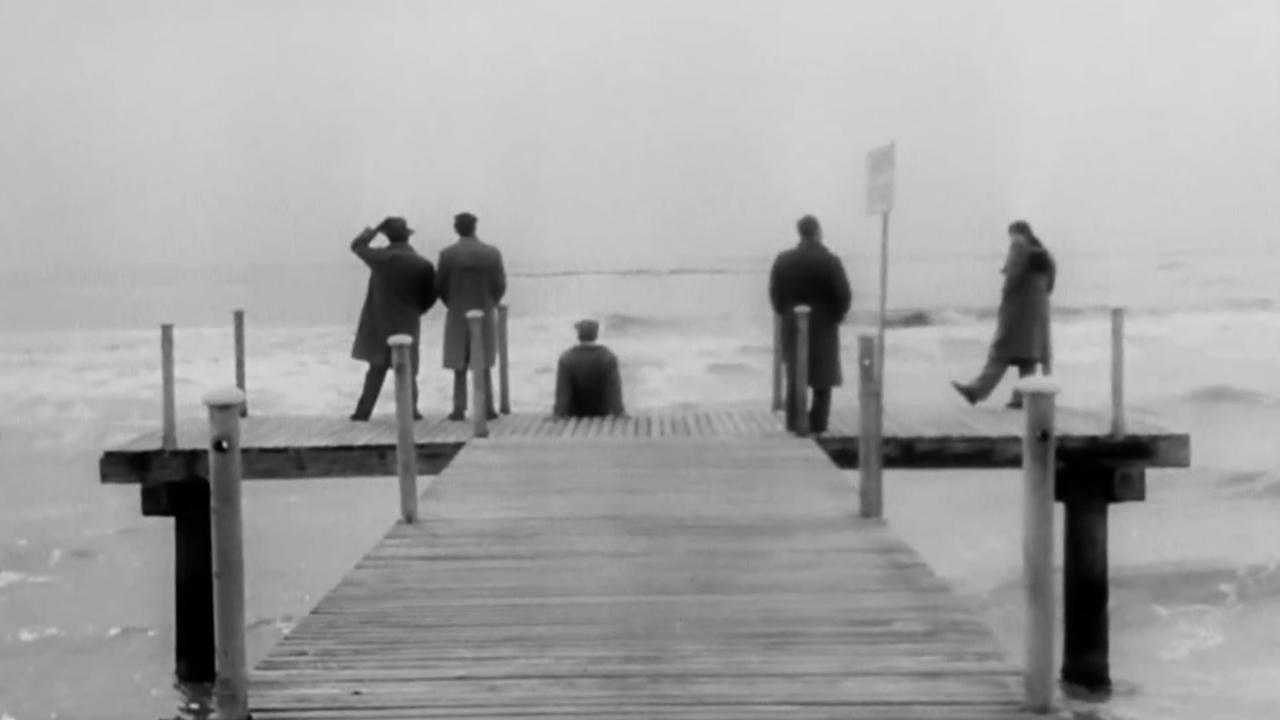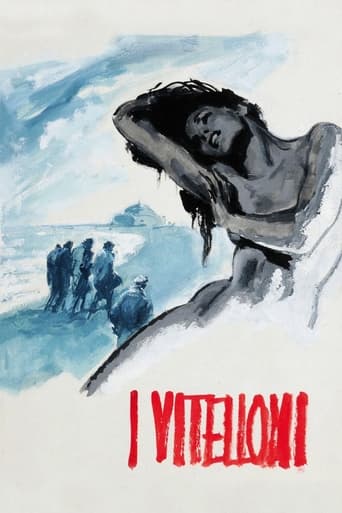

Too much about the plot just didn't add up, the writing was bad, some of the scenes were cringey and awkward,
... View MoreIt's a mild crowd pleaser for people who are exhausted by blockbusters.
... View MoreThe movie's not perfect, but it sticks the landing of its message. It was engaging - thrilling at times - and I personally thought it was a great time.
... View MoreExcellent and certainly provocative... If nothing else, the film is a real conversation starter.
... View MoreHere's an example of why this movie - admired by Kubrick and Scorsese and following five young deadbeats roaming around a small Italian city - is great.One of our protagonists, Fausto, is fiercely berated by his stern father. Fausto's girlfriend (sort of) is pregnant and the young man - who fancies himself to be a casanova - must marry her to save her honor (and his own family's). Humiliated, he leaves the house and finds his friends waiting for him in the dark street outside. They've heard everything and stand there looking at him, all awkward and sympathetic... and suddenly burst into a colossal laugh.No matter how realistic, most movies have a certain conventional, staged quality to them; few manage to portray small moments as vivid as the little bit of schadenfreude I mentioned above, or as other scenes showing how sad parties get late at night, how creepy a meeting with a near-stranger can be, how much resentment boils beneath the surface even between friends. Each one of the five heroes eventually faces troubles and humiliations, a darker undertone showing through the cracks of the light facade.Featuring an iconic scene with a young Alberto Sordi gesturing obscenely to a group of road workers before his car sputters and stops next to them, to his terrified dismay.9/10
... View MoreSet in a small suburban town in the early Fifties, I VITELLONI refers to a group of twentysomething men, all jobless, who spend their days loafing around and their nights playing pool, drinking, and roaming the streets picking up available women. They have no prospects in life; nor do they really appear willing to improve themselves. Vannucci (Leopoldo Trieste) a would-be playwright, spends much of his time pretending to work and ogling a neighboring girl.Things change when Fausto Moretti (Franco Fabrizi) has a shotgun wedding to Sandra (Eleonora Ruffo) and returns from honeymoon with a wandering eye. He makes a pass at shop-owner Rubibi's wife (Paola Borboni), and subsequently enjoys a one-night stand with a local "actress." Sandra absconds, forcing Moretti to rethink his life and make decisions.Shot in grainy black-and-white by Carlo Carlini, Otello Martelli, and Luciano Trasatti, Fellini's second feature depicts a dead-end world of cramped buildings, lonely streets and walls festooned with dog-eared posters. The group of young men adumbrate similar groups as depicted in British neo-realist films such as BILLY LIAR (1962) - testosterone-filled, insecure yet perpetually willing to show off in a world dominated by convention. To succeed in life you need to work, get married, and start a family.There are few moments to interrupt the tedium: one of these is the annual carnival, where the good burghers dress up in costumes of various hues and indulge in dancing, drinking, snogging and other revelries. Fellini communicates the desperation of the occasion with a whirling camera that circles the actors, with the music getting faster and faster ("Yes,sir, that's my baby") until it becomes a blur of jangled notes. Time passes: and we see the aftermath of the occasion, with a single trumpeter playing for an exhausted guest unwilling to go home.The film is not without its humorous elements, notably the portrayal of the fastidious Signior Rubini (Enrico Viarisio) walking self- importantly round his shop, stuffed to the brim with loudly ticking clocks and other curios. Yet the overall tone is one of sympathy for the young men, even Fausto - the forename is symbolic - whose infidelity is attributable mostly to boredom. He keeps massaging the sides of his brilliantined hair, in an attempt to render himself attractive to women; but his life is doomed to be a succession of one-night stands.The film is narrated by Moraldo, one of the group of young men (Franco Interlenghi) in tongue-in-cheek style; at the end he says that social order has been restored, but maybe temporarily. No one knows what will happen to the group in the future - save, perhaps, for Moraldo who is forced to leave the small town in search of work, as well as trying to suppress his homosexual feelings towards the young railway worker Guido (Guido Martufi). There is an overall feeling of dissatisfaction, shared by viewers and performers alike.
... View MoreAn early Fellini and a wonderful one at that. While it is not my favourite Fellini(my top 5 being Nights of Cabiria, La Dolce Vita, 8 1/2, Amarcord and La Strada), it is one of his best and sadly one of his more neglected works. The film does look gorgeous, with rapid yet fluid cinematography and beautiful scenery. Nino Rota's score brings great pathos to every scene it appears in, the script is funny, tense and moving and while familiar in a way the story is engaging. The character studies are just as impressive, these are distinct characters that you do care for. You don't perhaps quite identify with them in the way you do with the titular characters of La Strada and especially Nights of Cabiria, but they are not as detached as some of Fellini's later films like Casanova or Satyricon(my least favourite Fellini but still has its interest points). Fellini's direction is restrained yet quirky and charming, the complete opposite of self-indulgent or dull like him and some of his later films have been criticised for being. The acting is very good indeed, Franco Fabrizi as Fausto especially is superb. All in all, a wonderful film and one of Fellini's better films while not quite among my absolute favourites from him. 9/10 Bethany Cox
... View MoreA marvellous, involving and moving, swirling, humane and believable look at life an Italian seaside town. At first when we are introduced to the bunch of 'young' men, I thought that, as with US and UK films of the period, we were having to accept 30 year olds as 20 year olds. But no! These layabouts, loafing about, picking up girls and older women, are 30 year olds still living with their mamas and expecting everything to fall into their laps (and their lips!). Getting pregnant still a big deal, of course, and if the 'youngsters' think little of the consequences the older generation certainly seem to get together to get some sort of result. There are many wonderful sequences in this, ever beautiful tapestry of life in the 50s and the director even manages to get in plenty of carnival in this early film.
... View More